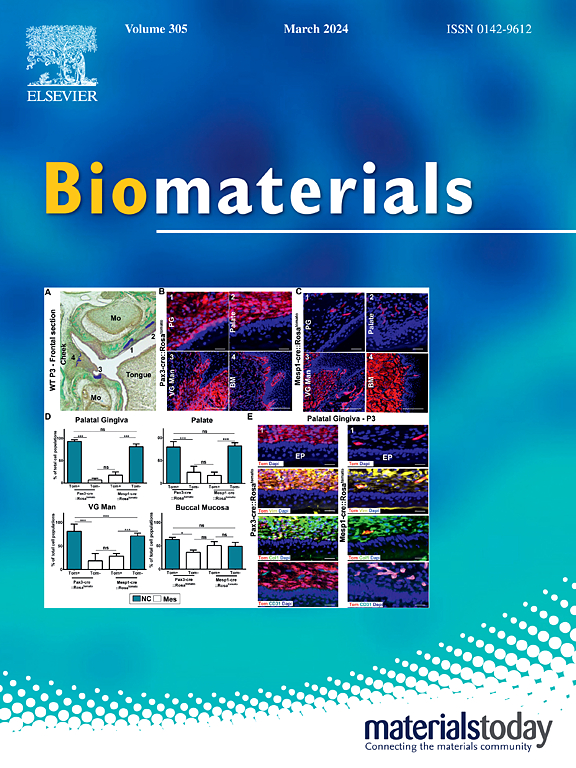Ellagic acid-protein nano-complex inhibits tumor growth by reducing the intratumor bacteria and inhibiting histamine production
IF 12.8
1区 医学
Q1 ENGINEERING, BIOMEDICAL
引用次数: 0
Abstract
In recent years, there has been growing interest in understanding the role of bacteria within tumors and their potential as targets for cancer therapy. In this work, we developed an ellagic acid (EA) – endogenous protein (eP) nanocomposite (eP-EA) to target tumors by EPR (enhanced permeability and retention), kill bacteria within tumors to regulate anti-tumor immune responses. The potential mechanism of eP-EA treatment is associated with the reduced abundance and diversity of microorganisms within the tumor, culminating with an altered metabolism within the Tumor microenvironment (TME). Among them, the metabolite histamine that contributes to tumor progression, is significantly reduced in the TME after eP-EA treatment. We show that one possible mechanism by which these microbes promote tumor growth is through the production of histamine. This work suggests that the ellagic acid (EA)-protein nano complex can enhance cancer immunotherapy by targeting the intratumoral bacteria and reduce their production of histamine, delineating the potential relationship between intratumor bacteria and their impact on tumors. Our work suggests that the EA-protein nano complex can enhance cancer immunotherapy by targeting the intratumoral bacteria, suggesting the role of bacterial metabolites in contributing to tumor progression.
鞣花酸-蛋白纳米复合物通过减少肿瘤内细菌和抑制组胺的产生来抑制肿瘤的生长。
近年来,人们对了解细菌在肿瘤中的作用及其作为癌症治疗靶点的潜力越来越感兴趣。在这项工作中,我们开发了一种鞣花酸(EA) -内源性蛋白(eP)纳米复合材料(eP-EA),通过EPR(增强渗透性和滞留性)靶向肿瘤,杀死肿瘤内的细菌,调节抗肿瘤免疫反应。eP-EA治疗的潜在机制与肿瘤内微生物丰度和多样性的降低有关,最终导致肿瘤微环境(TME)内代谢的改变。其中,促进肿瘤进展的代谢物组胺在eP-EA治疗后的TME中显著降低。我们表明,这些微生物促进肿瘤生长的一种可能机制是通过产生组胺。这项研究表明,鞣花酸(EA)-蛋白纳米复合物可以通过靶向肿瘤内细菌并减少其组胺的产生来增强癌症免疫治疗,描绘了肿瘤内细菌与其对肿瘤的影响之间的潜在关系。我们的研究表明,ea蛋白纳米复合物可以通过靶向肿瘤内细菌来增强癌症免疫治疗,这表明细菌代谢物在促进肿瘤进展中的作用。
本文章由计算机程序翻译,如有差异,请以英文原文为准。
求助全文
约1分钟内获得全文
求助全文
来源期刊

Biomaterials
工程技术-材料科学:生物材料
CiteScore
26.00
自引率
2.90%
发文量
565
审稿时长
46 days
期刊介绍:
Biomaterials is an international journal covering the science and clinical application of biomaterials. A biomaterial is now defined as a substance that has been engineered to take a form which, alone or as part of a complex system, is used to direct, by control of interactions with components of living systems, the course of any therapeutic or diagnostic procedure. It is the aim of the journal to provide a peer-reviewed forum for the publication of original papers and authoritative review and opinion papers dealing with the most important issues facing the use of biomaterials in clinical practice. The scope of the journal covers the wide range of physical, biological and chemical sciences that underpin the design of biomaterials and the clinical disciplines in which they are used. These sciences include polymer synthesis and characterization, drug and gene vector design, the biology of the host response, immunology and toxicology and self assembly at the nanoscale. Clinical applications include the therapies of medical technology and regenerative medicine in all clinical disciplines, and diagnostic systems that reply on innovative contrast and sensing agents. The journal is relevant to areas such as cancer diagnosis and therapy, implantable devices, drug delivery systems, gene vectors, bionanotechnology and tissue engineering.
 求助内容:
求助内容: 应助结果提醒方式:
应助结果提醒方式:


